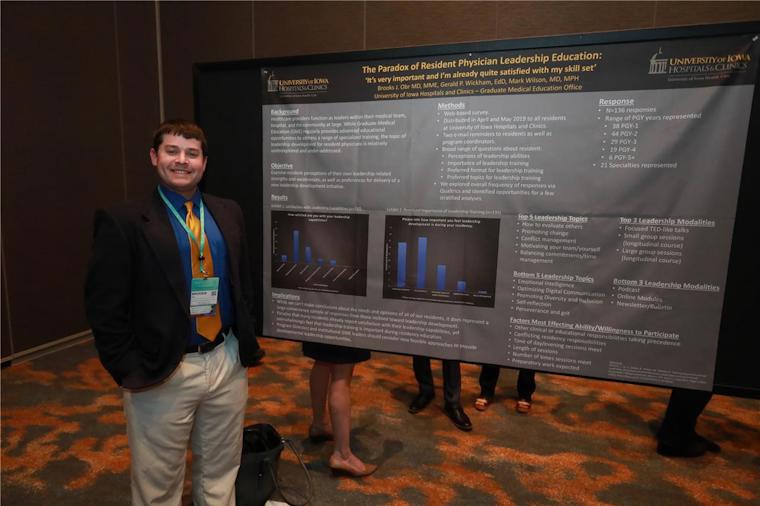Physicians are, by virtue of their position in the exam room and in society, leaders. Yet there is a dearth of leadership education and training curricula for residents and fellows in graduate medical education. In the poster, “The Paradox of Resident Physician Leadership Education: ‘It’s very important and I’m already quite satisfied with my skill set,’” presented at the 2020 ACGME Annual Educational Conference in San Diego in February, Dr. Brooks J. Obr explores residents’ and fellows’ attitudes toward leadership education, as well as the kinds of activities they feel are effective in teaching them leadership skills.
Primary Author: Brooks J. Obr, MD, MME
Co-Authors: Gerald P. Wickham, EdD; Mark C. Wilson, MD, MPH
ACGME: Tell us about your academic and professional role.
Obr: I am an assistant program director for the emergency medicine residency at the University of Iowa Hospitals and Clinics. I am additionally the medical student clerkship director. In addition to these roles/responsibilities and working clinically, I also work with my colleagues to facilitate the Chief Resident Leadership Development Program for the University of Iowa Hospitals and Clinics.
ACGME: Can you briefly describe your project for us?
Obr: Health care providers function as leaders within their health care teams, the hospital, and community at large. However, there is a relative lack of dedicated teaching curricula related to leadership for the general resident population. We wished to evaluate resident perceptions of their own leadership capabilities, and resident-perceived need (and preferred format) of a prospective leadership development curriculum. This was performed via a web-based survey with subsequent analysis of returned results.
ACGME: What inspired you to do this project?
Obr: While at the University of Iowa Hospitals and Clinics we do have a leadership development curriculum for our current/prospective chief residents, leadership training opportunities for the general resident population are limited. Given the rapidly changing state of health care today, health care providers will play an increasingly important leadership role in the future as it pertains to shaping our health care system. We wished to ensure that our residents had the opportunity to partake in leadership training opportunities to further develop these skills.
ACGME: What did you discover?
Obr: A diverse population of resident responses was obtained, spanning several PGY years and 21 specialties. The top four leadership topics residents identified as the most interesting were “how to evaluate others,” “promoting change,” “conflict management,” and “motivating your team/yourself.” Leadership training was reported as either “extremely” or “very” important by 72.6 percent of respondents, but 83 percent reported they were already satisfied to some degree with their leadership capabilities. When ranking the perceived best modality to teach these topics, “focused TED-like talks” and “small group sessions (longitudinal course)” were the two most commonly selected modalities.
ACGME: What was the main takeaway?
Obr: These responses reflect a paradox that many residents already report satisfaction with their leadership capabilities, yet overwhelmingly feel that leadership training is important during residency education. Additionally, it appears that program directors and institutional GME leaders should consider new feasible approaches to provide developmental leadership opportunities.
ACGME: Who could benefit from this?
Obr: All institutions of higher medical education could benefit from these results, as they indicate a perceived very high interest from residents in focused leadership training initiatives. Furthermore, the results provided by residents indicate novel approaches to this type of training, which could be implemented and further analyzed for efficacy.
ACGME: Any additional follow-up plans?
Obr: In the event that a leadership curriculum is implemented, further study of the efficacy of this curriculum/its manner of delivery would be performed. Furthermore, we are considering a multisite collaborative study examining similar topics among other institutions of residency education.

